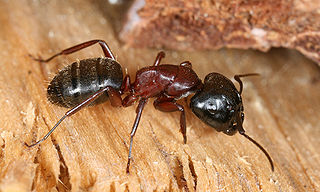
Carpenter ants are large ants indigenous to many forested parts of the world.

Gustav L. Mayr was an Austrian entomologist and professor in Budapest and Vienna. He specialised in Hymenoptera, being particularly known for his studies of ants.

Monomorium is a genus of ants in the subfamily Myrmicinae. As of 2013 it contains about 396 species. It is distributed around the world, with many species native to the Old World tropics. It is considered to be "one of the more important groups of ants," considering its widespread distribution, its diversity, and its variety of morphological and biological characteristics. It also includes several familiar pest species, such as the pharaoh ant and the flower ant.

Camponotini is a tribe containing 2 extinct ant genera and 8 extant ant genera, including Camponotus. Ants in the Camponotini tribe are the primary hosts of Ophiocordyceps unilateralis, also called the zombie-ant fungus.

Camponotus americanus is a species of carpenter ant. The ant is above average in length with worker ants being 7–10 mm (0.28–0.39 in) long. Despite normally nesting in soil, it is known that the species may nest under stones, under litter, or in rotten logs.

Camponotus japonicus, commonly known as the Japanese carpenter ant, is a species of ant native to eastern Asia. It is black, and one of the largest ants. A nest has about ten to thousands of individuals, and it can be a pest when it enters households or protects aphids. There are several subspecies of this ant in different areas of Asia, with the largest of the species being located in northern China.
Camponotus bishamon is a species of carpenter ant endemic to Japan.

Camponotus herculeanus is a species of ant in the genus Camponotus, the carpenter ants, occurring in Northern Eurasia, from Norway to Eastern Siberia, and North America. First described as Formica herculeana by Linnaeus in 1758, the species was moved to Camponotus by Mayr in 1861.

Camponotus floridanus, or Florida carpenter ant, is a species of ant in the genus Camponotus. First described as Formica floridana by Buckley in 1866, the species was moved to Camponotus by Mayr in 1886. The ant is widespread in Florida and occurs as far north as North Carolina and as far west as Mississippi.

The golden tail sugar ant is a species of ant in the genus Camponotus. It is native to eastern Australia and was described by Gustav Mayr in 1862.
Camponotus albipes is a species of carpenter ant in the subfamily Formicinae. It is found in Sri Lanka.
Camponotus irritans is a species of carpenter ant. It is found in many Asian and Oceanian countries.
Camponotus latebrosus is a species of carpenter ant in the subfamily Formicinae. It is found in Sri Lanka.

The black-headed sugar ant, also known as the brown sugar ant, is a species of Formicinae ant endemic to Australia. Found throughout most states, the species is a member of the genus Camponotus, a cosmopolitan genus of ants commonly known as carpenter ants. It was formally described and named by British entomologist Frederick Smith in 1858. These ants are characterised by their black head, reddish-brown mesosoma and black gaster, which can change in colour.

Camponotus niveosetosus, commonly known as the hairy sugar ant, is one of the smaller species of sugar ant. It is native to an extensive region in the eastern Afrotropics.










